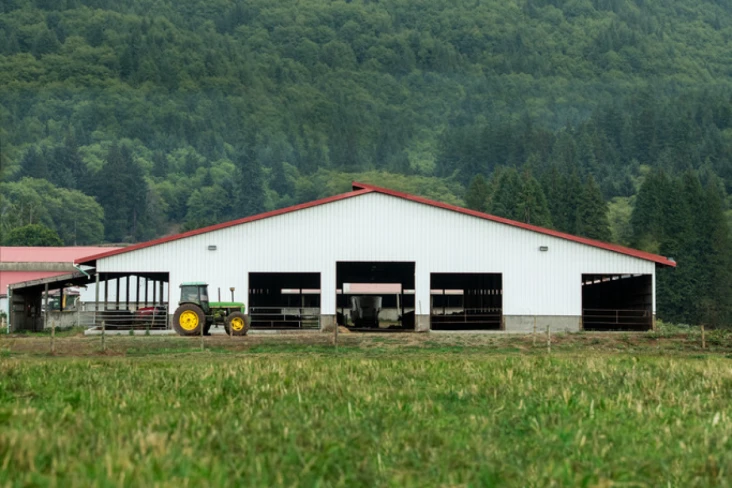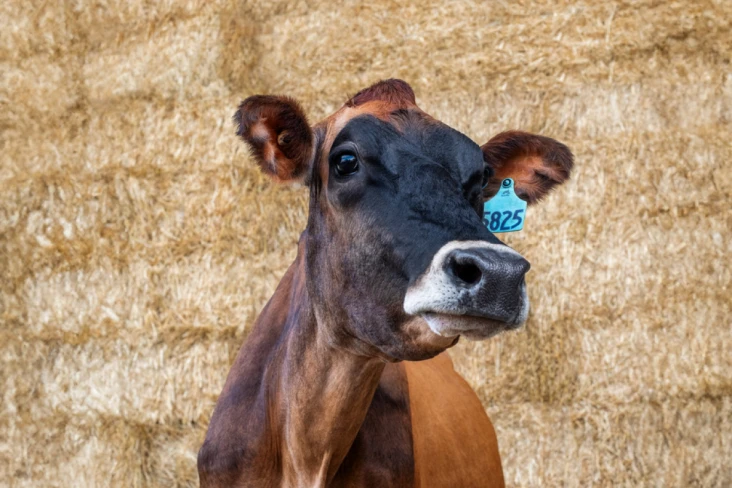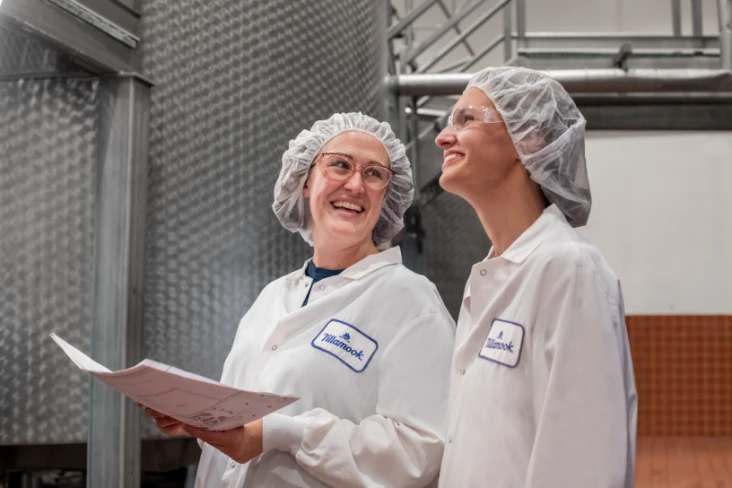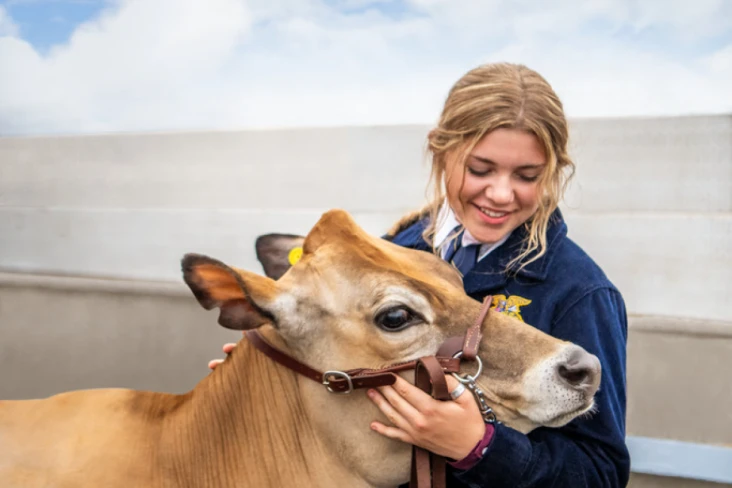2022 GLOBAL REPORTING INITIATIVE ISSUE BRIEF
At Tillamook County Creamery Association (TCCA), it is imperative that we maintain and improve traceability and transparency throughout our supply chain operations. Purchased goods and services account for a large percentage of our total environmental footprint, and the production and distribution of products and services may be associated with underlying social and ethical impacts. To uphold the integrity of our products, we are committed to the responsible sourcing of milk and seek to procure sustainably sourced raw ingredients, materials and services in our increasingly complex supply chain.
One of our Stewardship Charter commitments is Inspired Consumers. We’ve created policies and procedures around responsible sourcing to ensure quality products for our consumer stakeholders. Our Supplier and Contract Manufacturer Expectations Manual — which is part of our quality expectations of suppliers — outlines applicable programs and policies that support the production of safe, high-quality and sustainable products. Our sub-policy on Supply Chain Transparency outlines our operating principles for achieving traceability and transparency in our supply chain. Additionally, our Cooperative Member Handbook and the Contract Milk Supplier Handbook guide the contractual requirements for milk sourcing and quality.
Key Players:We have several departments working together to ensure responsible sourcing, including our Environment and Community Impact team, Supply Chain team, Farm Services team and the Product Development team. Our Supply Chain Department leads procurement efforts across TCCA along with a number of groups that purchase or procure their own materials, including Operations, Tillamook Creamery Visitors Center, Farm Store and our Engineering department. The Supply Chain Department’s scope covers purchasing, demand planning, supply planning, warehousing, logistics and shipment management, management of all external or contract manufacturers (including sourcing new contract manufacturers) and procurement of manufacturing materials (including ingredients, packaging and indirect materials). The team also evaluates supplier performance (suppliers and external manufacturers) and the performance of existing contract manufacturers. The Farm Services Team manages milk supply from our member farms.
The Environment and Community Impact team supports sustainable procurement efforts by leading the Stewardship Supplier Engagement Program. This involves working cross-functionally with other teams to uphold our commitment to product excellence and identify long-term sourcing goals. TheEnvironment and Community Impact team benchmarks our suppliers’ environmental, social and ethical impacts; research best practices in responsible sourcing; measures and tracks supplier sustainability scorecards; and tracks related KPIs on a regular cadence. The team also responds to frequently asked questions posed by customers (TCCA’s grocery, retail and foodservice associates) and consumers about supply chain transparency and ingredients. We are currently in the process of assessing how we can improve our sustainability surveys, utilize supplier sustainability scorecards and expand results of our program to achieve greater transparency in our supply chain.
For over 110 years, TCCA has been farmer-owned and farmer-led. We have two manufacturing facilities — one in Tillamook, Oregon, and another in Boardman, Oregon. As customer demand and geographic distribution has increased, we have added production capacity with carefully selected co-manufacturing partners to meet the needs of our customers beyond the Northwest. (By customers, we are referring to the grocery, retail and foodservice companies that stock our products.)
Milk is currently sourced through a combination of direct and indirect sourcing through TCCA cooperative farmer-owners, non-owner contract milk suppliers and through our contract manufacturing alliances. Throughout this process, we are vigilant in understanding the sourcing of all milk used in our products and ensuring it complies with our rigorous quality standards and values. Our other ingredients, materials and services are produced through a combination of internal manufacturing activities at our Tillamook and Boardman facilities; through supply relationships with contract manufacturers, suppliers and subcontractors primarily based in the United States. We are continuing to develop more robust reporting calculations and metrics to further understand traceability in our supply chain. Some of these efforts include analyzing the percentages of our budget dedicated to diversity spend, meeting general traceability, B Corp, and internal sustainability goals. Currently, we are also in the process of developing dependable calculations and definitions to determine the percentage of our procurement budget dedicated to local suppliers.
In 2018, we initiated our Stewardship Supplier Engagement Program (SSEP) to monitor and evaluate the social, environmental, and ethical performance of our supply chain. This program requires participating suppliers and co-manufacturers to complete a sustainability self-assessment survey on the reputable supplier ratings platform EcoVadis. The questions cover environmental, labor and human rights, along with ethical and sustainable procurement practices. In 2020, we expanded the SSEP metric to recognize and include the significant supplier traceability programs we have in place for milk received at our Tillamook and Boardman facilities. Our TCCA Cooperative Member Handbook and Contract Milk Suppliers Handbook list milk quality, safety requirements, environmental protection and worker health and safety requirements, for milk sourced from our TCCA member farms and all contract milk. Our Farm Services Team conducts regular formal and informal farm visits and inspections including the FARM animal welfare standards and milk quality assessments. Under our SSEP, we have also included spend covered within the scope of our environmental footprint. Through a combination of these platforms and assessments, we continue to gain visibility into the sustainability performance of our high-priority ingredient, packaging, information technology and other suppliers via scorecards and assessment results with a goal of 100% participation. In 2021, to attract additional supplier participation and meet our SSEP goals, we added the Supplier Ethical Data Exchange platform (SEDEX) as an alternative platform for suppliers to use. With two sustainability reporting platforms, EcoVadis and SEDEX, prevalent in the CPG world, this step will drive transparency faster and ease potential strains on suppliers by reducing multiple program memberships and administrative costs.
Key Performance Indicator (KPI): In 2022, suppliers accounting for 71% of our total supplier spend participated in our SSEP.
Supplier Scorecards: Our Procurement Team has developed a Supplier Scorecard that incorporates multiple metrics to track business relationships. In 2020, we included additional questions about environment, community, and diversity aspects of our suppliers, and created a numeric scale to rank them for KPIs used internally.
Milk and Co-Manufacturer Traceability: We request that suppliers and contract manufacturers sourcing dairy ingredients directly from farms participate in our Stewardship Supplier Engagement Program. They are asked to provide supporting documentation on quality, safety, and on-farm practice indicators to establish milk-sourcing traceability to the farm. Additionally, through our Contract Milk Suppliers Handbook and our Co-Manufacturer Expectation Manual, we count on our suppliers to operate their businesses according to the United Nations Guiding Principles on Business and Human Rights.
Examples of additional considerations in the survey and our Stewardship Supplier Engagement Program — based on the size, location, and sector of participating suppliers — include, but are not limited to:
Environmental considerations such as adherence to general sustainable business practices; record of documented policies; actions and results regarding environmental management; tracking and minimization of natural resource usage; and greenhouse gas emissions and air emissions.
Ethical considerations such as anti-corruption and fair competition practices; no conflicts of interest; no fraud or bribery; and no unauthorized access to personal and business information.
Sustainable procurement considerations, such as environmental performance and social practices of suppliers and manufacturing associates.
Human rights considerations, such as right to legal wages and benefits; no child labor, slave labor or forced labor; maintenance of health, safety, and hygiene; and other considerations.
This approach allows us to better understand our suppliers’ overall sustainability performance, thereby increasing transparency throughout our supply chain.
In 2021, we were awarded the prestigious 2020 SPLC Leadership Award for our work in establishing a sustainable procurement framework through our Stewardship Supplier Engagement Program. Award winners were evaluated by a panel of sustainable purchasing experts for the breadth and quality of their sustainable purchasing strategies and impacts. As part of our Stewardship Charter, we commit to responsible sourcing and transparency throughout our supply chain, and we are honored to be recognized by SPLC for our work. As members of the Sustainable Purchasing Leadership Council, we continue to align our sustainable procurement efforts with global best practices and standards.
We are in the process of improving our vendor model in Power BI to track additional characteristics of our vendors, such as minority-owned, women-owned, and local suppliers. This aligns with our Inclusion and Diversity goals. We have been actively developing our supplier diversity program and continue to baseline diversity spend and implementing focused strategies to drive improvement. We increased our 2018-2019 diversity spend by over $2M and created a multi-year plan to improve diversity spend and visibility including:
2019-2020 implemented Enterprise resource planning (ERP) system.
2021-2022 supplier mapping.
2020-2022 diversity spend improved with new baseline established of over $18M.
Moving forward we will increase diversity spend by approximately 2% each year 2023-2025 and 2024 develop additional outreach processes.
Proposed:
Tillamook has continued to action on our multi-year, intentional, Supplier Diversity journey we started in 2018. We implemented new systems improving our visibility and improved our diversity spend by another $2M. Our key supplier surveys gave us a more robust understanding of our suppliers and we learned that there is over $11.3M in supplier diversity spend within their supply chains and established a new diversity spend baseline for ourselves so we can seek year on year improvements. We’ve shared our journey, including at Proper Portland’s Supplier Diversity Forum in May, to raise awareness and share best practices. And our Sr. Purchasing Manager obtained his Certified Professional in Supplier Diversity certification in August of 2022.
Milestones & Next Steps:
2019 increased diversity spend by approx. $2.5M.
2020 improved spend visibility and established over $18M in diversity spend.
2021-2022 Improved diversity spend by another $1.6M.
2023-2024 increase diversity spend by another $1M by committing to improving diversity spend by 2-3% each year.
2023 complete further supplier mapping.
2024 develop new supplier outreach tactics & new 3-to-5-year plan to address 2025 and beyond!
We continue to improve our Stewardship Supplier Engagement Program and refine our vision for supply chain transparency through sustainable procurement. This allows us to identify ways we can better support our suppliers and contract manufacturing associates in their own sustainability journey. Our goal is to work with our suppliers over time to bring them along on our journey of continuous improvement, using our alliances to become better together. It is not just a transactional relationship, but a framework of leveraging our leadership to improve industry performance as a whole.
As a supplier to grocery stores and other customers, we recognize the importance of our own role in other companies’ supply chains, which is why we are active participants in multiple customer questionnaires, surveys, and audits. In 2019, our Tillamook and Boardman manufacturing facilities conducted their social and ethical compliance audit through the Supplier Ethical Data Exchange (Sedex) standard, with a Sedex Members Ethical Trade Audit (SMETA). The audit assessed employee satisfaction and comfort, along with site safety. As a result, our Tillamook facility’s overall performance in the SMETA audit was comparable to the top 10% of companies audited. Our Boardman facility also produced positive SMETA audit results.
The California Transparency in Supply Chains Act of 2010 requires companies to disclose efforts to eliminate slavery and human trafficking in supply chains. TCCA requires compliance with all applicable laws, rules, and regulations in the jurisdictions in which we conduct business, including laws related to the prohibition of human trafficking and slave labor.
Through our Contract Milk Suppliers Handbook and our Co-Manufacturer Expectation Manual, we expect our suppliers to comply with the California Transparency in Supply Chains Act. We do not currently engage in detailed actions described in Section 3(c)(1)-(5) (verification, audits, certification, internal accountability, and training) of the California Transparency in Supply Chains Act.
This statement is made in compliance with the California Transparency in Supply Chains Act of 2010 and is not directed nor is it to be interpreted under any other law or regime.
As a trusted partner to our customers and consumers, we believe it is our duty to provide transparency, traceability, and visibility across our value chain. We recognize that continued investment in partnerships and technology are necessary to realize our vision of end-to-end traceability. To that end, Tillamook is a founding member of the Oregon Transparency Initiative, a public-private partnership that seeks to advance supply chain transparency across Oregon industry.

U.N. Sustainable Development Goals
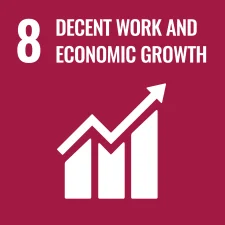
Goal 8
Promote Inclusive and Sustainable Economic Growth, Employment and Decent Work for All
Continued growth and strategic procurement allow us to provide more jobs for the local economies. We are working to ensure our business partners provide similar opportunities.
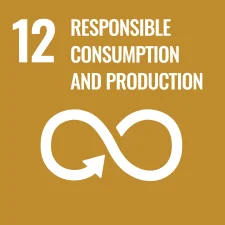
Goal 12
Ensure Sustainable Consumption and Production Patterns
Through our Stewardship Supplier Engagement Program and a heightened focus on our supply chain, we are taking steps towards sustainable consumption and production patterns.
